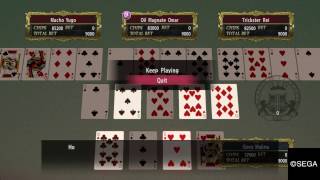Blackjack Strategy Video Source & Information:
0:00 BlackJack ( my last game)
1:09 Poker ( Omaha)
Casino games ( BlackJack, poker etc) require you to “cash out” to get your winnings. It’s no use simply winning, losing, and breaking even during one session and expecting it to count towards completion. You’ll have to back out of the minigame and get the tally to add to your completion metric of wins. That said, any losses you accrue from cashing out don’t apply to the completion metric
BlackJack Rules
An old standby among western casino games. Get as close to 21 without going over. You begin the game with a bet, which in this case can be between 10 and 100 chips for low-stakes blackjack, and between 100 and 1000 chips for high-stakes blackjack.
Once play begins, everyone is dealt two cards, and the dealer is dealt one card face up and one face down. If you are dealt a “blackjack”, which is an ace and any card valued ten (10 or any face card), you automatically win 2.5 times your bet. If the dealer is dealt a blackjack, all players that don’t have a blackjack lose. If both the dealer and a player have a blackjack, it’s ruled a “push” and the player’s bet is returned to them.
If the dealer is dealt an ace as its face up card, the player has the option of buying “insurance”. Insurance costs half your bet, but if you pay for it and the dealer has blackjack, you get your bet back at the cost of the insurance you paid. Most people suggest not taking insurance and just taking the loss.
If no one has blackjack, normal play begins. The objective is to get as close to 21 as possible without going over. Aces can be worth 1 or 11. Face cards are worth ten. All other cards are worth their stated value. The player is asked how they’d like to proceed. If they “Hit”, they’ll be dealt a new card. If at any time they hit and go over 21, they “bust” and automatically lose. If the player chooses to “Stand”, they’ll take no new cards. On the first play only, the player has a few other options. The player can choose to “Double Down”, which will double the player’s bet and they’ll only take one extra card and stop. Most people do this if they start with 11. Another option is to “Split” if they have a pair. This will have the player split the pair into two hands, and each will get another card, and you’ll have a separate bet on each hand. The last option is to “Surrender”, which half your bet will be returned to you. Useful if you think you have no chance of winning.
If you didn’t bust and choose to stand, the play now goes to the dealer. The dealer has very specific rules to play by. If they’re at 16 or below, they hit. If they’re at 17 or above, they stand. If the dealer busts, every player who didn’t also bust wins. Once the dealer stands, cards are compared and the higher total wins. If the player’s and dealer’s hand are of equal value, it’s called a “push” and the player gets their bet back. If the player wins, they get double their bet. If the player loses, they lose their bet.
Poker:
I Choose Omaha Hold ‘Em: each player gets four hole cards, and then by the end of the hand, each player makes the best possible hand with exactly two of their hole cards, and exactly three of the community cards.
So, as to the actual play of the game, you’ll be dealt your hole cards and you’ll have the option of how to bet. At just about any time you can select “Fold” to be out of the hand until the next one, but any blinds and other bets you’ve made will be lost. To “Check” is to not make a bet. If you’re the last person to “Check”, then the round ends. To “Bet” is to open the betting at a fixed amount, after which other players must call, raise, or fold. To “Call” is to match the bet of someone who has previously bet with the same amount. If all remaining players call the bet, then the round ends and goes to the next one. To “Raise” is to increase the bet at a fixed amount, and all other players must now call, raise, or fold on this new bet. Once everyone has settled on a bet (or folded), then the round moves to the next one until the showdown. If at any time all other players but one fold, the remaining one wins the pot by default. If it comes to a showdown, then the player with the highest hand wins the pot.
Now, how about getting that ten million, eh? Well, this can be a bit of slog if you get unlucky. The important thing is that your winning is not only a result of having a good hand, but also convincing your opponent they have a better hand. If you raise too much too early, most opponents will back the heck down and fold, but if you don’t raise at all, then even if you do win, it’ll be for tiddlywinks. It’s a long process of winning and losing that you’ll probably want to monitor every so often to see if you’re getting close. Once you get a good hand and a fair amount, make sure you quit so that you can cash that out and add it to your winnings
Special Thanks: CyricZ
Source: YouTube








Nice…. stil havent played black jack yet. just started Leyend dificulty 2 days ago.
Blackjack is making me want to kill myself. I can only bet 100, if I win, then 300, if I win again, then 500, then in the thousands. So I can’t bet a giant amount all at once. And if I get to that point in a win streak, I bet more than a thousand or two and lose it loveing all, then have to start betting at 100 again.
Betting low until you release the high values, what a smart strategy, you really are saving me